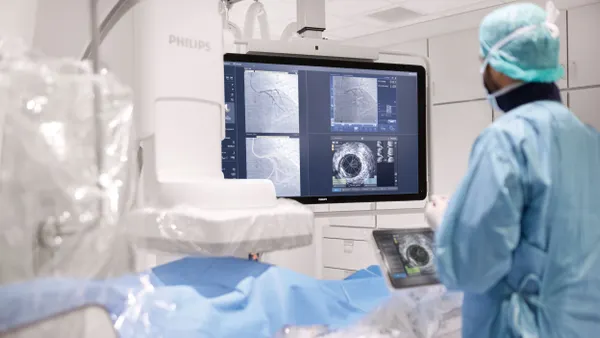Dive Brief:
- Stryker has given a bullish assessment of its long-term prospects, arguing that big orthopaedic trends such as the rise of robotics and shift to ambulatory surgery centers favor its business.
- Investors went into Stryker's analyst day on Thursday with concerns that growing competition in robotics and the accelerating transition of procedures to ASCs will favor its rivals. However, Stryker downplayed those concerns and framed the trends as supportive of its delivery of above-market growth.
- Though Stryker did not provide a specific long-term sales growth target, management plans to use M&A to supplement the inorganic growth, with CEO Kevin Lobo saying that, while the multiples of some public targets are high today, the company is "poised and ready to pounce" if they suffer a couple of tricky, value-deflating quarters. Jefferies analysts in a note estimated the "the size of the incremental deal wallet at $10-$10.5bn flexing debt limits alone suggesting ample opportunity for sizable M&A going forward."
Dive Insight:
The analyst day gave Stryker a chance to look beyond near-term challenges related to the ongoing impact of COVID-19 on elective procedures and to discuss why it believes the company is positioned for success in the longer term. In doing so, Stryker addressed whether its Mako robotic surgery system can maintain momentum now Johnson & Johnson has entered the space and Zimmer Biomet has expanded its offerings.
Stryker made an early move into orthopaedic robotics, paying $1.65 billion to buy Mako Surgical back in 2013 and going on to install more than 1,300 systems, up by 300 since the last public count around one year ago. Surgeons now have alternatives to Mako but Lobo framed that as a positive.
"Every booth, every sign [at two recent conferences] was 'robots, robots.’ That's acted more as a tailwind than frankly a problem for us, because we know we have the best solution. Maybe people were waiting for the competitor to come up with theirs, but we love our chances side by side against any of the systems out there today," Lobo said.
Analysts have also questioned whether moving orthopaedic procedures from hospitals to ASCs can dislodge Stryker from its leadership positions, particularly as rivals such as Zimmer Biomet and Smith & Nephew are trying to capitalize on the trend.
Stryker sought to reframe the ASC trend as a positive for its business at the analyst day, holding a Q&A session with physicians who work at ambulatory centers and have moved knee replacements to the outpatient setting. The event reassured analysts at Evercore ISI.
"We thought SYK did a good job in outlining why its breadth of product portfolio was enabling it to gain share in ASC; we were particularly pleased by mgmt.'s comment of ASC margins being comparable to corporate. Relative to competition, mgmt. expressed confidence in its ability to retain its #1 share position," the analysts wrote in a note to investors.
J.P. Morgan analysts noted that there are more than 6,000 Medicare-certified ASCs in the U.S. currently, half of which do some form of orthopaedics, with 500 to 600 performing joint replacement surgeries. The analysts contend that Stryker’s end-to-end portfolio, including lights, booms, beds, and implants, position the company to capture share as procedures move out hospitals.
"The quicker turnaround time and reduced need for equipment with Mako makes it easier for ASCs to adopt robotics, a challenge that's inherent to soft tissue robots," the analysts wrote.
The Evercore analysts also welcomed Stryker's continued commitment to M&A, stating that the company has "gained core competency" in executing takeovers after striking more than 50 deals in Lobo's time as CEO. Stryker has shown a willingness to make fairly big bets, splashing $4 billion on Wright Medical, but is currently being put off by the valuations of some public companies.
Lobo told the analysts "there are a number of assets that are just a little bit out of range." As such, Stryker is biding its time until the stock market's valuation of the assets comes into line with what it is willing to pay.
That is what happened with Wright Medical, which Stryker identified as an asset of interest years ago but waited until they "earned their way into their valuation," Lobo said. Stryker is also ready for when the sheen comes off newly public medtech companies and valuations fall.
"The elevator ride up on the IPO is fun, but they miss a couple quarters, you guys write nasty reports and then the elevator ride down will be very swift," Lobo told the analysts. "We've seen that, and we've been able to take advantage of that. We've bought companies like Invuity and Novadaq that took the elevator ride down after having spectacular high valuations. And so we'll be poised and ready to pounce when those opportunities present themselves."
Greg Slabodkin contributed reporting.











